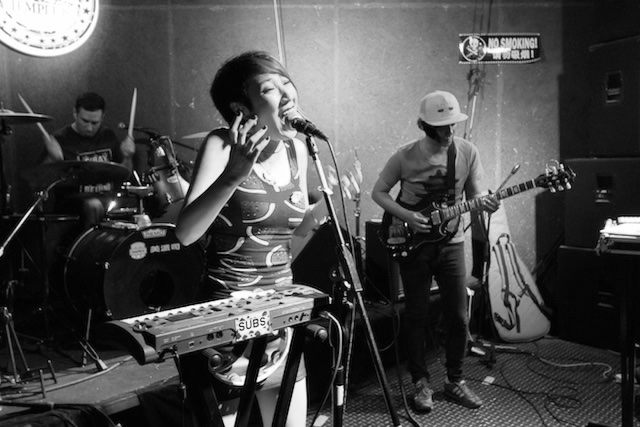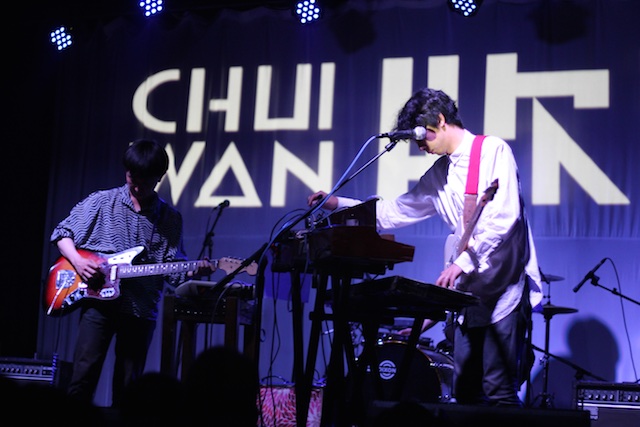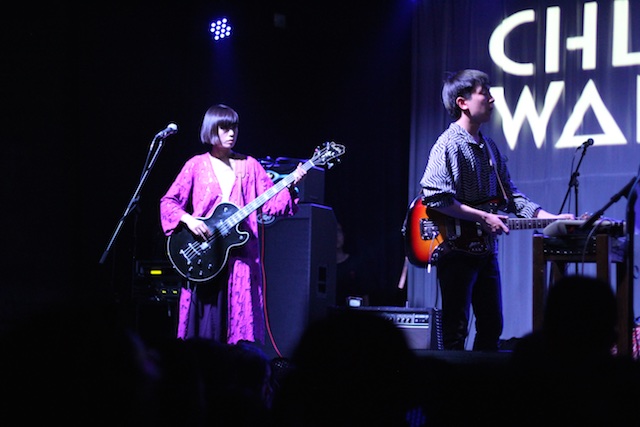Eight years ago, I launched what I affectionally called Project Dementia. This project threw me into the Beijing indie rock scene in a mission to find, film, and interview the movers and shakers of that scene. The project resulted in over 40 hours of film I shot of the indie music scene, not just in Beijing but elsewhere in China as well, including lengthy interviews with over a dozen key players in that scene. It also resulted in around 20 long journal entries adding up to around 30,000 words describing the bands, clubs, and festivals that I encountered along the way.
After moving to Shanghai in 2008, I then embarked on the creation of a documentary film highlighting my experiences and discoveries, Down: Indie Rock in the PRC. I joined together with fellow American filmmaker Jud Willmont to make this film. Four years later, after many trials, tribulations, and triumphs (you will know exactly what I mean if you spend hundreds of hours in a small, dark studio with another human being producing a creative, non-financed indie film), we completed the film, and since then it's screened in film festivals and academic conferences around the world.
Recently, having completed my latest book project, Shanghai Nightscapes, co-authored with Dr. James Farrer (the parenthetical statement above applies here too, but replace the word 'studio' with bars and clubs!), soon to be published by U Chicago Press, and feeling the usual empty nest syndrome, I took another look at all the materials I'd collected on China's indie rock scene since 2007--the blogs, the footage, the photos, the interviews--and decided that I had the basis for another book. Being a glutton for punishment, I sent a proposal to John Scanlan, the editor of Reverb, a series on music published by Reaktion Books. They got back to me quickly with an offer and a contract, and so here I go again!
Some friends have asked me why I want to write a book on indie rock in Beijing. After all, isn't my expertise in the field of Shanghai history, and my main musical interest in Jazz? Yes, that's true. And despite what audiences who see my film might think, I'm the first to admit that I'm not a leading expert on the indie rock scene in China. There are those who are far more embedded in the scene and have accumulated years of experience with it--often as musicians and producers as well as fans. One of those people, John Campbell has already written a great book about rock in China, Red Rock. Jeroen De Kloet, one of my colleagues in the field of China studies, has written China with a Cut, which covers a far wider swath of Chinese rock and pop music than I plan to do. I've also published an article along with Jeroen Groenewegen about the punk/indie rock scene in Beijing in 2007, 'Explosive Acts' (you can download it here).
My motivations for writing this book are manifold. First, I would argue that my position as an outsider is advantageous. I can take a more critically independent view of the scene without any heavy bias towards particular bands or styles of music that come out of the scene. Second, for me this is a great opportunity to hone my skills as a writer. Though I rely on many of the tools and methodologies that I've picked up over the years as a researcher and scholar, this is not an academic book per se. Yes, it's grounded in empirical realities and relies on some of the same research and analytical skills that I've put into my other book projects, but I write more from a first-hand experiential perspective. The structure of the book will basically follow my own journey into the rock scene, relying on the footage, interviews, and blogs I collected and created as materials. It's not meant to be an encyclopedic or authoritative account of Chinese indie rock, but rather an experiential journey into the heart of that scene during what many have called its 'golden age.' Which brings me to my third point: Nobody yet to my knowledge has written a book about this golden moment in the unfolding history of indie rock in China.
On Friday I headed up to the nation's capital to reacquaint myself with the scene, which I've only kept up with sporadically over the past eight years. My first stop was the XP Club, run by indie rock veteran promoter Michael Pettis. Though more well known for his expertise in finance, Pettis has been involved in the rock scene here in China for over a decade, and his involvement with cutting-edge rock goes back to the 1970s and New York City. Pettis is deeply invested in Chinese indie rock, having run one of the leading clubs in the city, D22, which from 2005-2008 served as the leading incubator for many of Beijing's best known indie rock bands, including Carsick Cars, Hedgehog, and many others. After that club closed down, Pettis started another club called XP. Located in the Di'anmen street corner near Houhai and Nanluoguxiang, this is a tiny, word of mouth club that focuses on more experimental acts.
Above the club is Pettis's office. On Friday evening I interviewed him for my book. We talked about his club, which is shutting down in July, and about the progression of Maybe Mars. When I first met him in 2007, he had just started a new record label called Maybe Mars and had recruited Yang Haisong, one of the leading musicians in the scene and frontman for the band PK-14, to help him run the label. They had just produced the Carsick Cars' first album to great critical acclaim, and gave a launch party for the album and the label at Yugong Yishan, one of the city's top indie rock clubs. Now, eight years later, Maybe Mars has produced over 60 albums. While they began with Beijing indie bands, they'd since expanded to produce albums by bands from all over China. XP served as an incubator and a place where some of the bands could be 'discovered'. Yang Haisong had quit the label after finding it was eating too much into his time for making music with his band (a statement corroborated by Yang the next day--as I will get to shortly) but after several years, Pettis convinced Yang to return to the label and help it get back on its feet.
Michael Pettis told me that among the bands that he's really into, two to watch are Birdstriking and Chuiwan. Fortunately, Chuiwan was launching their own second album also produced by Maybe Mars at Yugong Yishan on Saturday night, so I'd have a chance to see them perform to a crowd of several hundred people.
But first, I needed to touch base with one of my own favorite indie bands, the ultra-punk band SUBS, whom I'd followed all the way to Hunan and their hometown of Wuhan back in 2007. The stars were aligned for my mission, since Kang Mao told me that she was in town and would make an appearance at the Temple Bar on Gulou East Road. I walked over to the bar, which I'd never been to, though it's now been open for years. At the same time, I was hoping to connect with Josh Feola, who took over as the SUBS's drummer not too long ago. Turns out he was there too. I arrived at the bar around 9 pm, and couldn't find either of them. The bar looked and sounded like a typical American college bar, with a steady stream of rock classics pumped out as the bartenders pumped draft beers. The crowd was small and consisted of a mix of foreigners--mostly men with various displays of facial hair and tattoos--and Chinese--ditto, but with a healthy dose of ladies as well. Everyone seemed familiar with each other, and it eventually dawned on me that many of the guys in the bar were musicians, and many of them were performing that night.
The event that night was dubbed Drunkfest--or at least, the pre-amble to the Drunkfest happening the next day over in Tongzhou (which I did not attend). The first band was a group of foreigners come down from Harbin. They played a series of fairly derivative songs, but had great energy--especially the drummer, who also sang. The next band was also composed of foreigners, with a female drummer. (I didn't catch the names but I'm sure they're listed online somewhere--will dig up the link and post it). The third band was well-known in Beijing. Demerit was a Chinese punk band that took a lot of its inspiration from 70s bands like the Clash. They'd been around for many years and were veterans of the scene. They drew the largest crowd which peaked when they performed at around midnight, with maybe a hundred people in the audience. The club couldn't hold much more than that, and a larger group of people were spilling out from the club and from another club downstairs into the courtyard that fronted the venue, mostly in order to talk and smoke--since smoking thankfully is now banned from Beijing's clubs and bars. This is one government policy that I couldn't agree more with!
The fourth band of the night was being touted as the 'mystery band'--but you won't be disappointed! Much of the crowd departed after Demerit finished their act, but those who stayed were treated to a very special performance by none other than SUBS. Of course by that time I'd already found Kang Mao and Josh Feola had a chat, and so I knew they were going to perform. Kang Mao stood behind a small keyboard which she played on now and then, but mostly she sang--and as always, no matter the size or makeup of the crowd, she summoned her inner demons and threw herself deeply into her performance as if possessed. Wu Hao stood on her left, supporting the act on guitar, and Josh pounded the drums behind the pair. It was a riveting performance with some new songs and a few oldies. The crowd gathered closely around the band, mostly insiders to the scene, to watch the performance. Though I didn't stay through its entirety, I did get some good shots of Kang Mao in action.

The following evening, I met up with Yang Haisong outside of Yugong Yishan. I interviewed him upstairs of the club, and caught up with his doings over the years, including his recent re-involvement with Maybe Mars, and his own band PK-14. Yang is probably the most important single person in the indie rock scene in China, having supported so many bands and helped to produce their albums. He corroborated Michael Pettis's observation that the scene has expanded greatly in the past eight years since I first covered it in 2007, and that there are now bands in cities all over China doing very interesting and original music--both mentioned Chengdu as one of those cities, and Yang told me that he'd been producing one of the Chengdu bands. After the interview, I hung around the club and saw a band called The Eat--promising but still finding their original sound.

Then Chuiwan performed to a crowd of around 600 people. The hall was so packed that I had to fight my way close enough to the stage to take some decent photos. The band has been touted as having an Egyptian or Middle Eastern style. They like to play around exotic scales, playing in one dominant key and modulating a half step up to another in what we might call Spanish style (though the Spanish undoubtedly learned this from the Moors). Backed with heavy drums they create a powerful, rhythmic, hypnotic sound. It's very dreamy music, and they feature a light show projected on a screen behind the band. There's plenty of chanting by both the male lead and the female bassist, who was dressed in purple gown and had a China-doll haircut, making her look like a priestess of punk.

The music and the band struck me as dark and cultish. I can't say that they connected with their audience in the way that a singer like Kang Mao does--most of my shots showing them looking down at their instruments or at each other. Definitely a more cerebral act.
The only thing I did not appreciate was the sound engineering. Though equipped with a state-of-the-art sound console operated by a team of people behind the main sunken hall in front of the stage, the club didn't seem to strike a good balance among the sounds, and instead they just blasted everything out to the audience at the same high decibel level. I don't know why these clubs insist on turning everything up to 11, but maybe it has to do with training (or lack thereof), or else perhaps it's just what the club thinks the audience wants to hear. Personally I don't appreciate having my eardrums sandblasted, but at least my lungs are no longer being polluted by cigarette smoke, so progress is being made on some fronts if not on others. I'm sure some of the veterans in the scene have a better answer to this question of sound quality than I can offer here.
I look forward to taking in more bands and conducting more interviews as I rekindle Project Dementia and prepare to write my next book: Making Noise in the PRC: Indie Rock in China.